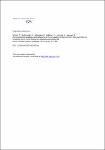FliA expression analysis and influence of the regulatory proteins RpoN, FleQ and FliA on virulence and in vivo fitness in Legionella pneumophila
Schulz, Tino
Rydzewski, Kerstin
Schunder, Eva
Holland, Gudrun
Bannert, Norbert
Heuner, Klaus
In Legionella pneumophila, the regulation of the flagellum and the expression of virulence traits are linked. FleQ, RpoN and FliA are the major regulators of the flagellar regulon. We demonstrated here that all three regulatory proteins mentioned (FleQ, RpoN and FliA) are necessary for full in vivo fitness of L. pneumophila strains Corby and Paris. In this study, we clarified the role of FleQ for fliA expression from the level of mRNA toward protein translation. FleQ enhanced fliA expression, but FleQ and RpoN were not necessary for basal expression. In addition, we identified the initiation site of fliA in L. pneumophila and found a putative σ(70) promoter element localized upstream. The initiation site was not influenced in the ΔfleQ or ΔrpoN mutant strain. We demonstrated that there is no significant difference in the regulation of fliA between strains Corby and Paris, but the FleQ-dependent induction of fliA transcription in the exponential phase is stronger in strain Paris than in strain Corby. In addition, we showed for the first time the presence of a straight hook at the pole of the non-flagellated ΔfliA and ΔfliD mutant strains by electron microscopy, indicating the presence of an intact basal body in these strains.
No license information
Related Items
Show related Items with similar Title, Author, Creator or Subject.
-
2010-05-04ZeitschriftenartikelIsotopologue Profiling of Legionella pneumophila Role of Serine and Glucose as Carbon SubstratesEylert, Eva; Herrmann, Vroni; Jules, Matthieu; Gillmaier, Nadine; Lautner, Monika; Buchrieser, Carmen; Eisenreich, Wolfgang; Heuner, KlausLegionella pneumophila (Lp) is commonly found in freshwater habitats but is also the causative agent of Legionnaires' disease when infecting humans. Although various virulence factors have been reported, little is known ...
-
2009-11-13ZeitschriftenartikelControl of Flagellar Gene Regulation in Legionella pneumophila and Its Relation to Growth Phase Albert-Weissenberger, Christiane; Sahr, Tobias; Sismeiro, Odile; Hacker, Jörg; Heuner, Klaus; Buchrieser, CarmenThe bacterial pathogen Legionella pneumophila responds to environmental changes by differentiation. At least two forms are well described: replicative bacteria are avirulent; in contrast, transmissive bacteria express ...
-
2013-01-25ZeitschriftenartikelRegulation, Integrase-Dependent Excision, and Horizontal Transfer of Genomic Islands in Legionella pneumophila Lautner, Monika; Schunder, Eva; Herrmann, Vroni; Heuner, KlausLegionella pneumophila is a Gram-negative freshwater agent which multiplies in specialized nutrient-rich vacuoles of amoebae. When replicating in human alveolar macrophages, Legionella can cause Legionnaires' disease. ...

